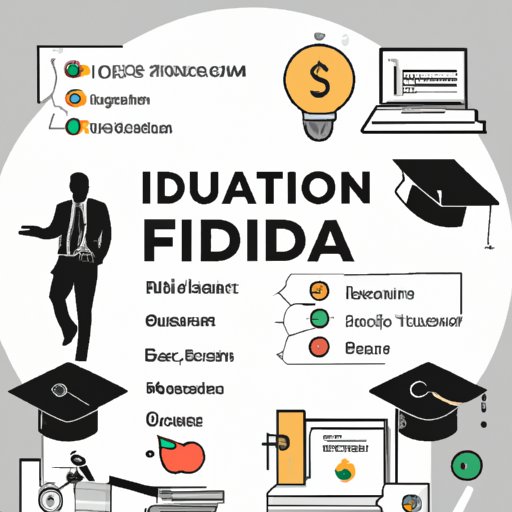Introduction
Financial advisors provide guidance and advice to individuals and organizations on how best to manage their money and investments. Becoming a financial advisor is a rewarding and lucrative career that requires a combination of education and professional credentials. In this article, we will explore what major you need to be a financial advisor and outline the various steps involved in this process.
Outlining the Education Requirements for Becoming a Financial Advisor
The first step to becoming a financial advisor is to obtain a bachelor’s degree. While there is no specific major required for this position, it is recommended that you pursue a degree in business, economics, finance, accounting, or mathematics. These majors will provide you with the foundation you need to understand financial concepts and markets. Additionally, some employers may require a master’s degree, so pursuing an advanced degree may give you an advantage in the job market.
Exploring the Different Degree Paths to Becoming a Financial Advisor
A bachelor’s degree in business provides students with an understanding of financial management principles, economics, marketing, and operations. A degree in economics focuses on economic theory, microeconomics, macroeconomics, and econometrics. A degree in finance covers topics such as corporate finance, financial planning, investments, risk management, and derivatives.
An accounting degree teaches the principles of accounting, auditing, taxation, and financial reporting. A mathematics degree focuses on calculus, linear algebra, statistics, and mathematical modeling. All these degrees provide the necessary knowledge and skills needed to become a financial advisor.

Examining the Role of Financial Advisors and What They Do
Financial advisors are responsible for analyzing markets, developing investment strategies, offering tax advice, and managing assets. They must have an in-depth knowledge of the financial markets and be able to make sound investment decisions. They must also be able to identify potential risks and opportunities in order to maximize returns.
Financial advisors must be able to communicate effectively with their clients and explain complex financial concepts in a clear and concise manner. They must also be able to evaluate a client’s financial situation and make recommendations based on their goals and objectives.
Investigating How You Can Specialize as a Financial Advisor
Financial advisors can specialize in different areas such as retirement planning, estate planning, insurance, and investment banking. Retirement planning involves helping clients plan for their retirement years by suggesting investments and savings plans. Estate planning involves helping clients prepare for their death by creating wills and trusts.
Insurance involves helping clients choose the right type of insurance coverage for their needs. Investment banking involves helping clients make smart investments and providing them with advice on the stock market. Financial advisors can also specialize in other areas such as asset management and wealth management.

Examining the Professional Credentials Needed to Become a Financial Advisor
In addition to a degree, financial advisors must also obtain certain professional credentials. The most common credential is the Certified Financial Planner (CFP), which is offered by the Certified Financial Planner Board of Standards. This credential requires passing a series of exams and completing a course of study.
The Chartered Financial Analyst (CFA) is another credential offered by the CFA Institute. This credential is designed for those who wish to work in the investment management industry. The Chartered Investment Manager (CIM) is offered by the Canadian Securities Institute and is designed for those who wish to manage investments for clients.

Analyzing the Impact of Technology on the Financial Advisor Profession
Technology has had a major impact on the financial advisor profession. Automation of investment strategies has allowed advisors to quickly analyze markets and develop effective investment strategies. Online access to financial data has made it easier for advisors to research and analyze investments. The increased use of social media has enabled financial advisors to reach out to a wider audience and offer personalized advice.
Conclusion
Becoming a financial advisor requires a combination of education and professional credentials. A bachelor’s degree in business, economics, finance, accounting, or mathematics is recommended. Additionally, obtaining professional credentials such as the Certified Financial Planner (CFP) or the Chartered Financial Analyst (CFA) is necessary. Financial advisors must also be aware of the impact of technology on their profession, as automation and online access to financial data are changing the way advisors do business.
(Note: Is this article not meeting your expectations? Do you have knowledge or insights to share? Unlock new opportunities and expand your reach by joining our authors team. Click Registration to join us and share your expertise with our readers.)
